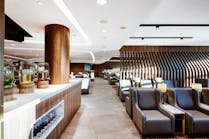Since joining the Port of Seattle in 2017, Dawn Hunter has played a crucial role in the redevelopment of dining and retail at Seattle-Tacoma International Airport (SEA).
Hunter's leadership has built the largest number of minority and women-owned businesses (WMBE) operating at SEA in the history of the airport and is a noted collaborator with dining and retail tenants to build a successful and inclusive program at one of the nation's largest airports.
Hunter was named the 2022 Airport Concessions Person of the Year by Airports Council International-North America (ACI-NA) due to her success. She recently share her vision and keys to the airport's success with Airport Business and how airports can enhance their retail and concessions programs.
What makes a high-quality concessions program for an airport?
A high-quality concessions program is multi-faceted with a good mix of concepts, both local and national brands. Local brands bring in the flavor of the community and give travelers a taste of the city and region. The mix does not end with the concepts, there should also be a mix of small businesses and primes. This increases options for travelers, expands access for small and local businesses, and gives the airport a personality.
What really makes a concessions program exceptional is staff that are more than contract administrators. You need people who understand the business and care about the tenants and our passengers. When the team cares deeply – like we do at Seattle-Tacoma International Airport – it creates an environment where businesses can thrive, and travelers can enjoy options and service that exceeds expectations.
What tactics did you take to help SEA add 50 new retail and restaurant locations between 2019 and 2022?
The Port of Seattle, which owns and operates Seattle-Tacoma International Airport (SEA), is nearing the end of a long-term dining and retail redevelopment program to increase options for travelers and expand access for small and local businesses. As an economic driver for the Pacific Northwest and a gateway to the globe, we aim to deliver a local sense of place to travelers by promoting job growth and creating new opportunities for small and minority-owned businesses.
SEA is significantly increasing customer choices, business opportunities, and local jobs by opening over 50 airport dining and retail establishments between 2019 and 2022.
Construction for concessions during the pandemic was incredibly tough. During the height of the global pandemic, 66 percent of airport dining and retail tenants at SEA temporarily closed due to the decline in air travel.
SEA is fortunate to have the strong leadership of Aviation Managing Director Lance Lyttle. With his guidance, and the approval of the Port of Seattle Commission, we created a program of financial relief for our dining and retail tenants such as lease extensions, rent deferrals, barring evictions, and temporary suspension of the Minimum Annual Guarantee.
Moreover, our team partnered with tenants on creative solutions to move design review and construction forward with the least amount of impact to the tenants. This included a process improvement where the airport is involved with demolition and infrastructure input prior to a tenant entering a space. The program also created partnerships with community partners to assist with finding employees to staff the units and our internal resources helped navigate supply chain issues.
Despite these challenges, ingenuity and teamwork prevailed. I am in awe of our tenants and team for opening eight new dining and retail concepts in 2020, nine in 2021, and three so far in 2022 with more to come.
You’ve increased the number of DBE/WBE businesses at SEA to a record level. Why was this important to you and how did you go about finding the right partners to achieve this goal?
Advancing women and minority businesses in airports is one of my career passions. Diversity is a necessity in cultivating a high-quality program, so we also want to assure inclusivity. The team at SEA has created a partnership environment where every business and WMBE firm is valued.
The right partners are key to this success. Prime tenants including SSP America, Hudson, Host, Dufry, Stellar Partners, and many others have done an excellent job with partners that understand the Seattle market and bring incredible knowledge in retail, food and beverage, and services. SEA appreciates the joint venture partnerships and our primes commitment to our program.
SEA’s local concepts are beloved in the community, and these street side vendors have now become a part of our family. This is accomplished by a strong team seeking concepts that work in the airport and teaching classes on how to do business here, starting by breaking down the RFP process. We are removing the barriers that are daunting for smaller businesses.
Explain the policies you created/introduced to capitalize on new business opportunities at the airport and how the airport was able to capitalize on them.
The Port’s emphasis on equity in this process is changing the equation for women and minority-owned business while expanding dining, shopping, and service options for passengers. Policies to increase opportunities for WMBE/ACDBE businesses at the airport allowed our concessions team to focus on entry micro and small businesses.
SEA has a kiosk program that offers short-term retail opportunities for qualified small, local retailers for six, 12, and 18-month lease terms. Infrastructure in these spaces is provided and maintained by the Port to provide more flexible and less expensive options for new concessionaires interested in operating at the airport.
The kiosk program is designed to mentor micro and small retail businesses on how to do business with the airport. This coupled with policies to increase WMBE/ACDBE businesses gave birth to a new portion of the program. In 2019, we developed a Food and Beverage Incubator Kiosk program with three food and beverage units, including all the infrastructure and equipment. SEA is one of the best incubators for small businesses, and the kiosk program is increasing our WMBE/ACDBE numbers.
You’re noted for your collaborative attitude with partners. Tell me why this is an important quality for a concessions program and how you build a collaborative atmosphere with all the stakeholders involved.
It’s important for airports to build strong relationships with all our tenants and be their advocate. Collaborative and trusting relationships are earned over time through real mentorship, inclusivity, and care. It means being a champion for our businesses and investing in entrepreneurs with the knowledge and support to be successful.
Involvement in both national organizations and boards as well as partnerships with other airports and concessionaire-based organizations has allowed us to bring new, innovative, and collaborative concepts and ideas to SEA and spread those innovations across the aviation industry.
Moreover, building and maintaining close and collaborative rapport means that when we need to have difficult conversations, or have events like COVID-19, we work together and develop solutions that are a win for the airport and our tenants.
What is the biggest challenge you see for airport concessions programs going forward?
It is time to reimagine how we do business moving forward. RFPs and concessions contracts have remained generally the same for the past two decades. Food and beverage contracts have hovered around 10 years term and retail at seven to eight years. The industry recognizes that construction, operational and labor costs have increased. Many airports have regulated sales at street pricing or added additional cost like Centralize Delivery Centers, yet the business models have remained the same. Existing standards must evolve to keep businesses viable. When our business partners make money, we make money.
You’ve accomplished a lot in just five years. What are your goals for the next five years?
I love working in this industry. It is so rewarding to advance my people, support our tenants and experience the recovery of the airport economy. Becoming Director of Aviation Commercial Management in 2020 has deepened my focus on customer service innovation and expanding economic opportunities.
I recently served six months as Acting Chief Operating Officer of Aviation at SEA, which was insightful and increased my aviation knowledge base. I’m inspired to learn as much as I can about airports function. My goal is ultimately to be an airport director.
What advice would you give to airports of all sizes looking to improve their concessions programs?
Think about the city or region you service. Bring that flavor into the airport. Build a team that understands business and wants to collaborate with partners to enhance the customer experience.
Most importantly, give a small business a chance. I once worked with an ACDBE business that went on to start winning so many contracts that they were bought by a major prime. View the investment of your staff’s time to nurture and mentor the business as an opportunity to make change.
What do they need to focus on to achieve their goals?
Every airport has a brand promise. At SEA, we promise to create an elevated travel experience that’s inspired by the Pacific Northwest and a passionate service culture. The best way to achieve your goal is to measure everything by that promise. The promises always surround providing the highest level of service.




